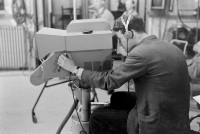SCREEN PLAYS
Channel 4
Classics on TV: BFI Southbank programme, 23 June 2012
Today sees the fourth programme in the five-night Screen Plays season Classics on TV: Greek Tragedy on the Small Screen at BFI Southbank. This afternoon and evening we will see The Oresteia, the Channel 4 version of the landmark 1981 National Theatre production of Aeschylus’ trilogy directed by Peter Hall. (No tickets for the 3.50pm showing are available via the BFI website but it may be worth getting on the standby list in case some become available immediately before the performance.) Following the earlier screenings we tried an experiment, inviting anyone who was at the screening to contribute their thoughts about the programme on this blog. That experiment has been really successful, and so we will continue it for the two remaining screenings. Any and all responses would be welcome, however brief – and John Wyver and I will also be offering some further thoughts. Continue reading
Greek plays: the National Theatre’s The Oresteia (Channel 4, 1983)
Twenty or so years after ITV transmitted a production of Sophocles’ Electra in modern Greek and — astonishingly — without subtitles (about which I wrote a blog piece here), the second of the two known reconfigurations of theatre productions of Greek drama for British television was transmitted by Channel 4, less than a year after the network was established. Whereas the modern Greek Electra had posed a linguistic challenge for the audience in 1962, Channel 4’s transmission of Aeschylus’ Oresteia trilogy in 1983 — a televised version of the National Theatre’s 1981 all-male production directed by Peter Hall — was challenging in terms of its sheer length, for it ran over a 4½-hour slot on the evening of Sunday 9 October. In this long blog piece, I consider the other programmes which accompanied this viewing marathon, before going on to contextualise the production of Agamemnon, the first play in the trilogy, in terms of its place in Channel 4’s cultural programming schedule, think through some of the aesthetic effects of the production’s translation to the small screen and, finally, consider the contemporary critical response to the production. Continue reading
100 television stage plays: [10] 2001-2011
It was the worst of times; it was the best of times. There were fewer stage plays on British television in the first decade of the twenty-first century than in any previous ten-year period. The maturing of multi-channel broadcasting, coupled with additional competition from other home entertainment forms and the internet, increased the pressure on free-to-air terrestrial channels to deliver ratings. Filmed original drama was perceived to attract audiences far more effectively than stage plays, and the high production costs of the latter were only rarely out-weighed for commissioning channels by any reputational value, which in any case was in most cases thought increasingly to be of marginal worth. Continue reading
100 television stage plays: [8] 1982-1990
British television changed fundamentally with the arrival of Channel 4 on 2 November 1982. Independent production became for the first time a viable method of working with broadcasters – and the channel in these early years took seriously its statutory mandate ‘to encourage innovation and experiment in the form and content of programmes’. With ten productions from across the channels from the following eight years, this outline of one hundred significant television stage plays continues our first tentative map of the history of the form. Continue reading
Random (Hillbilly Films for C4, 2011)
Screen Plays is primarily concerned as a research project with the history of theatre plays on British television, but our interests certainly embrace contemporary stage adaptations as well. Television today, however, makes strikingly few such productions, so Random, screened this week on Channel 4, is a rarity. Developed as a film and directed by Debbie Tucker Green from her one-person drama first seen at the Royal Court Theatre in 2008, it is a richly distinctive and largely successful screen version, graced by a striking central performance by Nadine Marshall. Continue reading
Getting going: research resources and approaches
In this post my goal is to outline the research resources and approaches I’m employing in my case study ‘Greeks on screen’. Such transparency at an early stage of the research process may easily show up embarrassing omissions and intellectual bias. On the other hand, what follows may be of some use to those interested in starting to research television productions of stage plays and, to this end, additions and further suggestions from readers would be warmly welcome! Continue reading
Greeks on screen
One of my first research areas is going to be the production of Greek plays on British television from the 1950s, when the first Greek play appears to have been televised. The first well documented broadcast is a 1958 BBC World Theatre production of Women of Troy. I’ll say much more about Women of Troy in one of my next blog posts. Today my aim is to offer a taster of the range of productions of Greek drama on British television across the half century from the 1950s. Continue reading
